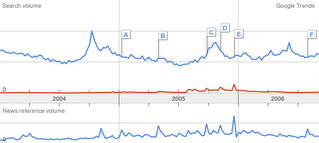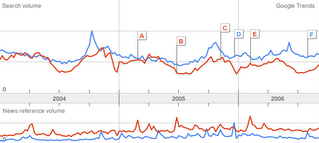There is a running debate among science bloggers about theistic evolution and whether or not theistic evolution is harmful to science education. On one side we have Laurence Moran and PZ Myers. Moran
writes:
"The fight against Intelligent Design Creationism and Young Earth Creationism is only part of the battle—there's a lot more involved in trying to improve science education. Some of it requires us to take a long hard look at the way science education is being eroded by well-meaning theists who don't belong in one of the obvious hard-core Creationist camps. Let's call them Theistic Evolutionists for want of a better term."
On the other side are Ed Brayton and
Pat Hayes.
Brayton writes:
"I reject the notion that belief in God, in and of itself, takes anything away from science education.
Ken Miller is a theistic evolutionist. His scientific work is impeccable, as are his efforts in science education. Can Moran point to anything at all in Miller's scientific work that is "sloppy"? I doubt it. Can he point to anything at all in his work on science education, the multiple textbooks that he has authored on evolutionary biology, that is affected in any way whatsoever by his Christian faith? Again, I doubt it."
Let's look at the debate which is being tracked by Pat Hayes over at Red State Rabble.
Moran argues that theistic evolutionists who postulate some sort of personal god that acts either by creating the laws of nature and steps aside-this seems more like deism- or a god who continually intervenes-this seems like continuous creation- are not behaving as scientists. He argues:
"So, is there a middle ground where an interventionist, personal God is compatible with modern science? Perhaps not. The conflict between religion and science certainly isn't avoided by postulating a passive God who doesn't play an active role in guiding evolution. If science really does have to be strictly naturalistic, then even the softest version of intelligent design—that promoted by Michael Denton—is ruled out because God creates the laws of physics and chemistry. This point is worth emphasizing. If one's explanation of the natural world posits a God who created the laws of physics and chemistry then one is not behaving like a scientist. Of course, there's even more of a conflict if one's God is supposed to have set up the universe in order to produce humans."
So for Moran, there is always going to be a conflict between belief in God and science and there is thus no middle ground of theistic evolution. Indeed toward the end of his essay he presents a charming little diagram that shows science on one side with its subdisciplines such as physics, chemistry, biology, geology and astronomy and on the other side non-science which includes perpetual motion, alchemy, astrology, intelligent design and theistic evolution.
Charming diagram, but it conveniently ignores one important issue. With the exception of theistic evolution, all of the other non scientific disciplines listed are pseudosciences that purport to make testable predictions about the universe.
OK, theistic evolution is not science: I agree with that. Ken Miller who is a theistic evolutionist is a first rate scientist who clearly does not let his religious beliefs interfere with doing science. In his science he uses methodological materialism, unlike Michael Behe who has confounded his religious beliefs with science. Now, Miller does attempt to explain how science is consistent with his faith and here I agree with
Amiel Rossow's analysis of Miller's arguments in a recent essay at talk reason. Rossow observes that:
"The best Miller is able to assert by way of argument is that quantum indeterminacy is compatible with his faith. I don't believe anybody would argue against such an assertion. However, quantum indeterminacy, if it indeed is a fact, is equally compatible with the lack of religious faith. Given Miller's evident great intelligence and eloquence, the paucity of real arguments in the yin part of his book seem to affirm the suspicion that real arguments in favor of faith which would be on a par with arguments normally accepted as legitimate in a scientific dispute, simply do not exist."
Rossow gets to the nub of my objection to Miller, namely that the best he seems able to do is find a space for God based on what he sees is the compatibility of belief with certain key areas of science. And to me this position seems close to the god of the gaps notion that infuses intelligent design and that is so roundly criticized by Miller.
Getting back to Moran's charming diagram, the issue is not science vs non-science. After all I write poetry which last time I checked, is not classified as a science and yet as a poet there is empircism involved in the sense of intense observation of some aspect of the universe and for a poem to work it has to effect the reader in some emotional sense. The best poems and works of literature are said to be timeless in that they speak to the readers across time. So there is a sense that a poem is an experiment that stands or falls in part on a repeatable response on the part of the reader. So the boundary between science and non science is not sharp since approaches to relating to the universe that are traditionally considered non scientific (art, poetry, music) rely in part on an informal sort of methodological materialism for their effectiveness.
Miller's stance is a philosophical one, namely that there is a God, that is constantly intervening in the operation of the universe, perhaps through quantum mechanics. However, God, if it exists, is outside the universe. As far as I can tell from reading Miller, he does not expect any way to positively test this idea. The best he can say is probably to argue, as did Pope John Paul, that true faith and true science cannot be in contradiction. I bet Michael Behe would agree with this. Indeed sometimes he sounds suspiciously like Miller. For instance
here:
"But how could biochemical systems have been designed? Did they have to be created from scratch in a puff of smoke? No. The design process may have been much more subtle. It may have involved no contravening of natural laws. Let’s consider just one possibility. Suppose the designer is God, as most people would suspect. Well, then, as Ken Miller points out in his book, Finding Darwin’s God, a subtle God could cause mutations by influencing quantum events such as radioactive decay, something that I would call guided evolution. That seems perfectly possible to me. I would only add, however, that that process would amount to intelligent design, not Darwinian evolution."
Does this similarity mean that Miller and other theistic evolutionists are to be dismissed as as being damaging to science education? The answer is no. To see why not contrast Michael Behe and Miller's approach to the irreducable complexity issue. Behe when confronted with an irreducably complex structure
says:
"Yet modern science has discovered irreducibly complex systems in the cell. An excellent example is the bacterial flagellum which is literally an outboard motor that bacteria use to swim. The flagellum has a large number of parts that are necessary for its function—a propeller, hook, drive shaft, and more. Thorough studies shows it requires 30-40 protein parts. And in the absence of virtually any of those parts, the flagellum doesn’t work, or doesn’t even get built in the cell. Its gradual evolution by unguided natural selection therefore is a real headache for Darwinian theory. I like to show audiences this picture of the flagellum from a biochemistry textbook because, when they see it, they quickly grasp that this is a machine. It is not like a machine, it is a real molecular machine. Perhaps that will help us think about its origin."
Miller on the other hand sticks to the
methodological materialism program and looks for explanations that do not require the supernatural:
"The very existence of the Type III Secretory System shows that the bacterial flagellum is not irreducibly complex. It also demonstrates, more generally, that the claim of "irreducible complexity" is scientifically meaningless, constructed as it is upon the flimsiest of foundations – the assertion that because science has not yet found selectable functions for the components of a certain structure, it never will. In the final analysis, as the claims of intelligent design fall by the wayside, its advocates are left with a single, remaining tool with which to battle against the rising tide of scientific evidence. That tool may be effective in some circles, of course, but the scientific community will be quick to recognize it for what it really is – the classic argument from ignorance, dressed up in the shiny cloth of biochemistry and information theory."
These two quotes show the contrast between Behe and Miller quite clearly. Both are theists and to the degree that Behe accepts the fossil record and evolution at least above the molecular level, perhaps Behe could be classed as a theistic evolutionist just as Miller is. But there is a fundamental difference. When confronted with something that looks designed, Behe entertains supernatural explanations. Indeed he claims that to argue that something that looks designed is not designed is really an extraordinary claim.
"Demonstration that a system is irreducibly complex is not a proof that there is absolutely no gradual route to its production. Although an irreducibly complex system can't be produced directly, one can't definitively rule out the possibility of an indirect, circuitous route. However, as the complexity of an interacting system increases, the likelihood of such an indirect route drops precipitously. And as the number of unexplained, irreducibly complex biological systems increases, our confidence that Darwin's criterion of failure has been met skyrockets toward the maximum that science allows."
Miller on the other hand recognizes the power of methodological materialism. Scientists use it along with the principle of uniformity to construct scientific explanations because it works and has worked repeatedly. Miller understands that jumping from the appearance of design to intelligent design is an extraordinary claim.
Miller like Behe might believe in the existence of God, the ultimate skyhook as Daniel Dennett would say. But as long as Miller and other theistic evolutionists plod along with methodological materialism and natural explanations, their theological accomodations are not really relevant to science.
Moran argues that there is no common ground between the rational and irrational and that you cannot accept evolution and turn around and allow for a god that can "tweak" the process whenever "He" wants. That is a philosophical position that one can accept or not; but when the goal is furthering science education, who better to have on your side than someone who may hold non scientific ideas but who understands that science is at its best when it building natural explanations, not by giving up as the Michael Behes of the world would have us do when confronted with apparent design, be it at the organismal, cellular or the molecular level.
Links in the Debate:http://redstaterabble.blogspot.com/2006/11/darwinian-fundamentalism-infantile.htmlhttp://bioinfo.med.utoronto.ca/Evolution_by_Accident/Theistic_Evolution.htmlh
ttp://www.ncseweb.org/resources/articles/6366_science_religion_and_evoluti_6_19_2001.asphttp://sandwalk.blogspot.com/2006/11/agnostics-are-whimps.htmlhttp://scienceblogs.com/pharyngula/2006/11/if_were_choosing_teams_now_i_w.phpTechnorati Tags:
Science educationtheismatheismscience















